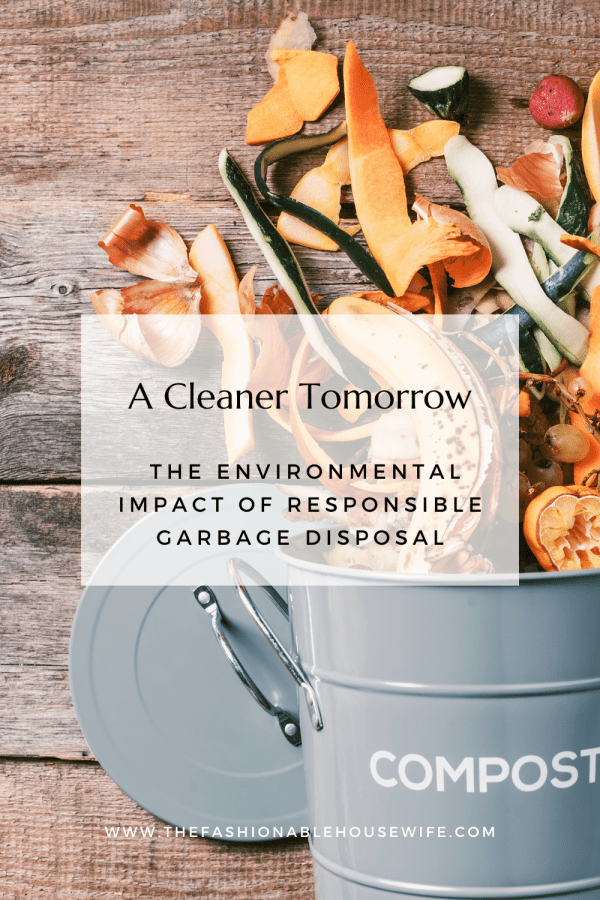
In a world where environmental concerns have become a shared priority, responsible garbage disposal has emerged as a critical focus. The actions we take today ripple through time, shaping the environment we pass on to future generations.
Responsible garbage disposal practices have a profound positive environmental impact, setting the stage for a cleaner and more sustainable future. By reducing waste, we can lessen the need for landfills and incinerators.
This not only conserves valuable resources but also minimizes greenhouse gas emissions, particularly methane. In tandem, initiatives like basement waterproofing services and bin rental newmarket play a role in this sustainability narrative by ensuring that construction and renovation projects are executed efficiently and with minimal waste generation. Together, responsible garbage disposal and these services contribute to a greener and more eco-conscious tomorrow.
The Global Garbage Crisis
Our planet witnesses an astounding volume of waste generated each year. According to the World Bank, this figure is projected to surge from 2.01 billion metric tons in 2016 to a staggering 3.40 billion metric tons by 2050. This alarming rise poses a substantial threat to our environment, affecting the quality of land, air, and water.
However, in the face of this daunting challenge, the role of waste management companies like bin rental newmarket becomes paramount. These companies aren’t just about collecting and disposing of waste; they’re the unsung heroes of responsible waste disposal. They provide the essential infrastructure and expertise needed to ensure that waste is managed efficiently and with environmental responsibility in mind.
Bin rental services in Newmarket, for instance, supply homeowners and businesses with suitable containers and options to appropriately categorize, recycle, and manage their waste. Collaborating with responsible waste management firms allows us to make a substantial contribution to minimizing the environmental effects of our waste, moving us closer to a greener and more sustainable future. This underscores the idea that the choice of the correct company can have a profound impact on our waste management efforts.
The Environmental Consequences of Irresponsible Disposal
Irresponsible garbage disposal practices, such as illegal dumping, open burning, and landfilling without proper containment, carry profound environmental repercussions. These practices have detrimental effects on our environment:
- Air pollution. The act of open burning releases harmful pollutants, including dioxins and particulate matter, into the atmosphere. These pollutants not only contribute to respiratory diseases but also exacerbate global warming;
- Soil contamination. Landfills and illegal dumping sites often leach hazardous chemicals into the soil, contaminating it with heavy metals, plastics, and other pollutants. This contamination disrupts ecosystems and negatively impacts agriculture;
- Water pollution. Inadequate waste management can lead to water pollution. Toxins from landfill leachate have the potential to seep into groundwater, rivers, and oceans, posing a threat to aquatic life and our sources of drinking water;
- Greenhouse gas emissions. Landfills are notorious sources of methane, a potent greenhouse gas that contributes to climate change. Responsible waste disposal methods like recycling and composting help reduce these harmful emissions.
Responsible Garbage Disposal: Paving the Way to a Cleaner Tomorrow
If you are really determined to make the future cleaner, use the following tips. They can give an idea of what exactly you need to pay attention to.
- Recycling. Recycling is considered one of the most powerful methods for reducing the environmental consequences of waste. It allows materials such as paper, cardboard, glass, and plastics to be converted into fresh products, preserving valuable resources and energy;
- Composting. The practice of composting organic waste, such as food scraps and yard trimmings, serves a dual purpose. It not only diminishes the volume of waste in landfills but also produces nutrient-rich soil amendments that benefit agriculture;
- Proper landfill management. Though landfills should be a last resort, their proper management is vital to minimize environmental harm. Modern landfills incorporate liners and leachate collection systems to prevent soil and water contamination;
- Waste-to-energy. Certain communities utilize waste-to-energy facilities, where waste is burned to generate electricity. This approach reduces landfill utilization and represents a cleaner alternative to open burning;
- Reducing single-use plastics. Curtailing the usage of single-use plastics, including items like plastic bags and disposable cutlery, plays a pivotal role in curbing plastic pollution. Many regions are enacting bans or fees on these items to encourage more responsible usage.
For instance, when renovating a basement in Toronto, homeowners are opting for eco-friendly construction materials with minimal plastic components. They choose waterproofing solutions that prioritize sustainability by using non-toxic sealants and coatings, which not only prevent water intrusion but also contribute to a healthier indoor environment.
Furthermore, responsible basement waterproofing services in Toronto are offering guidance on reducing single-use plastics during basement renovations. Instead of plastic bins, they promote using reusable containers and eco-friendly insulation to reduce plastic waste.
The Roles of Government and Industry
Government policies and regulations wield significant influence in shaping responsible waste management practices. Numerous countries have implemented recycling mandates, landfill regulations, and emissions standards to mitigate the environmental impact of waste disposal. Additionally, industries are increasingly adopting sustainable packaging and waste reduction strategies to meet consumer demands for eco-friendly products.
Community Engagement
Individuals and communities also hold a crucial role in responsible garbage disposal. Educational campaigns and awareness initiatives can promote recycling, composting, and responsible consumer choices. Community-driven clean-up projects help tackle issues such as illegal dumping and littering.
For example, many Canadian cities offer “Adopt-a-Street” programs that allow community groups, businesses, or individuals to adopt a street or public space. They commit to regular clean-ups, ensuring that their adopted area remains litter-free.
Great Canadian Shoreline Cleanup program, led by the Vancouver Aquarium and WWF-Canada, encourages Canadians to clean up shorelines, rivers, and lakes. Thousands of volunteers participate annually to remove litter and debris from these crucial aquatic ecosystems.
So, when we team up responsible garbage disposal we’ll be able to make our world greener and more eco-friendly. That’s something we can all be excited about!






